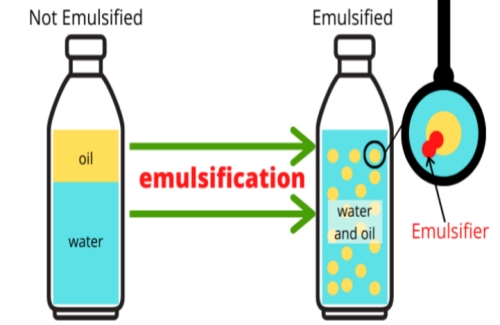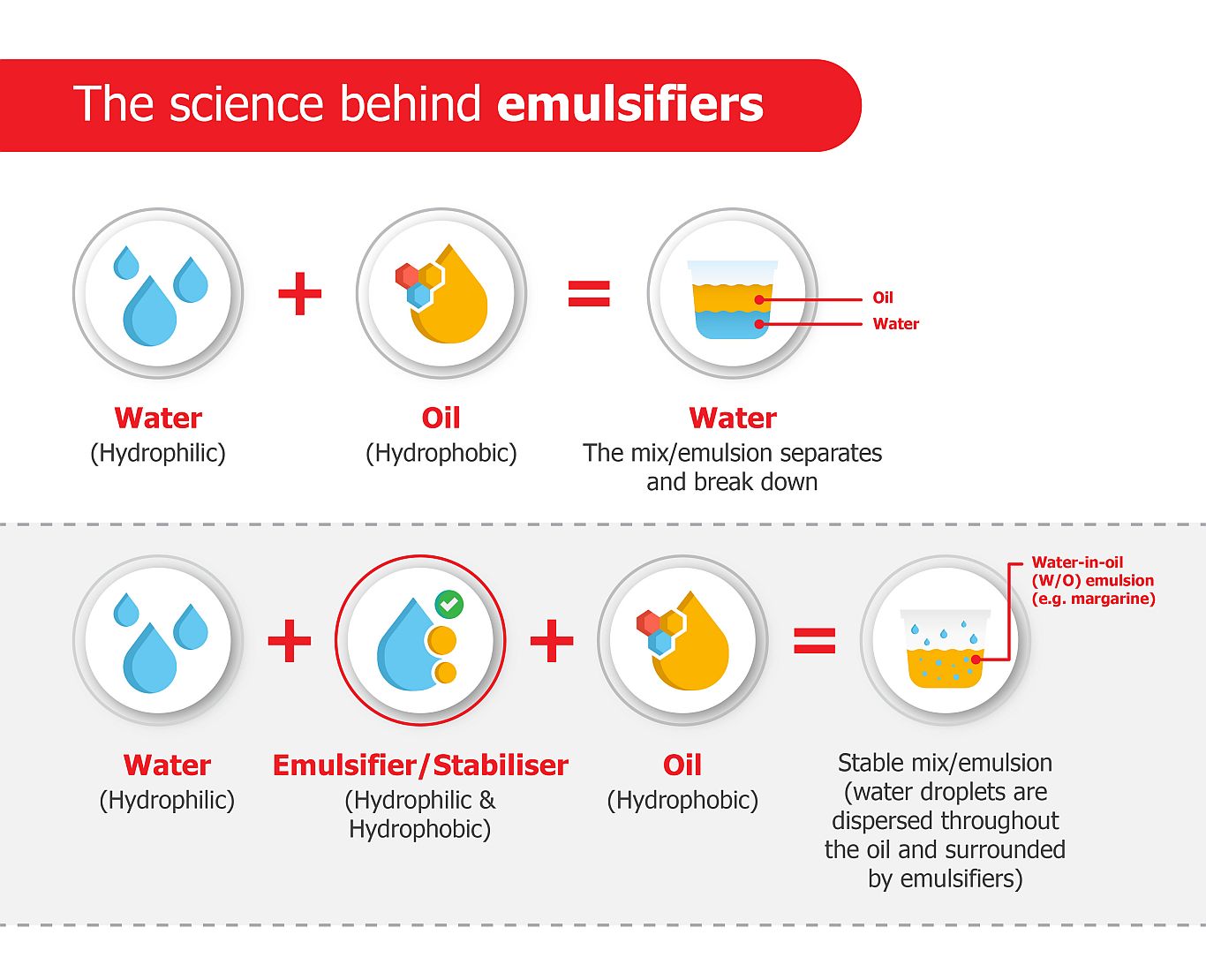Everything about the Function of an Emulsifier in Food and Its Relevance in Modern Cuisine
Emulsifiers are pivotal in modern-day cuisine, assisting in the blend of immiscible liquids like oil and water. Their ability to stabilize combinations enhances the structure and taste of numerous foodstuff. From salad dressings to baked items, emulsifiers play a significant function in both business and home cooking. The science behind their function and the future technologies in their usage remain less checked out. What more could be uncovered concerning these important cooking representatives?
Recognizing Emulsification: The Scientific Research Behind the Refine
Emulsification might appear like a straightforward culinary technique, it entails complicated clinical principles that are important for developing stable mixtures of immiscible liquids, such as oil and water. At the heart of this procedure exists the concept of surface stress, which prevents both liquids from mixing naturally. Emulsifiers, substances that minimize surface area tension, play a vital role in facilitating the mix of these fluids. They possess both hydrophilic (water-attracting) and hydrophobic (water-repelling) homes, permitting them to anchor themselves at the user interface in between oil and water.
When an emulsifier is introduced and the mixture is agitated, it forms a safety barrier around dispersed droplets of one liquid within the various other, stabilizing the mixture. This action not just enhances texture and mouthfeel in food items however additionally contributes to their visual charm. Emulsifier In Food. Recognizing the science behind emulsification is essential in contemporary food, enabling chefs to develop a selection of sauces, dressings, and emulsified meals
Typical Kinds Of Emulsifiers Made Use Of in Food
Emulsifiers are essential ingredients in the food market, playing a vital function in supporting mixes of oil and water. Various sorts of emulsifiers are frequently utilized, each with unique buildings fit for various applications. Lecithin, derived from soybeans or egg yolks, is one of one of the most prominent natural emulsifiers, commonly found in delicious chocolates and dressings. Mono- and diglycerides, which are stemmed from glycerol and fats, are extensively used in baked items and margarine to improve structure and extend shelf life. One more common emulsifier is polysorbate 80, favored for its capability to improve the consistency of ice lotions and sauces. Furthermore, xanthan gum and guar periodontal work as thickening representatives that also add to emulsification in gluten-free products. These emulsifiers are important to developing a steady, palatable product in modern-day food formulas, ensuring a pleasurable sensory experience for consumers.
The Role of Emulsifiers in Various Food Products
A selection of foodstuff rely upon emulsifiers to attain wanted textures and security. These materials help with the mixing of immiscible fluids, such as oil and water, which is essential in lots of processed foods. For instance, in salad dressings, emulsifiers assist keep a constant mix, avoiding separation and boosting rack life. In baked products, they add to a consistent crumb framework and dampness retention, boosting overall high quality.
Emulsifiers additionally play a considerable duty in dairy products, such as ice lotion and yogurt, where they support fat beads, making sure a smooth mouthfeel. Furthermore, in sauces and condiments, they enhance viscosity and improve spreadability. This performance is vital in the manufacturing of delicious chocolates, margarine, and mayonnaise, where a natural product is essential. Overall, making use of emulsifiers in numerous food products is important to modern-day food production, enhancing security and uniformity Continued across a variety of things.
Exactly How Emulsifiers Enhance Texture and Taste

When integrated into foodstuff, emulsifiers significantly enhance both texture and flavor, producing a more delightful consuming experience. These substances help with the mixing of components that commonly do not blend well, such as oil and water, resulting in a smoother, creamier consistency. This not only boosts mouthfeel but likewise allows flavors to disperse evenly throughout the item, magnifying the total preference.

Emulsifiers in Home Food Preparation: Tips and Techniques
Just how can home cooks properly make use of emulsifiers to improve their dishes? Emulsifiers play an essential duty in accomplishing desirable appearances and tastes in homemade recipes. As an example, using egg yolks in mayonnaise or hollandaise sauce enables a steady emulsion, combining oil and water efficiently. Home cooks can likewise trying out mustard, which works as an emulsifier in vinaigrettes, making certain a smooth uniformity.
In cooking, incorporating lecithin, discovered in egg yolks or soy, can boost dough stability and wetness retention. In addition, making use of commercial emulsifiers like xanthan gum or guar gum can help thicken sauces and dressings while keeping a luscious mouthfeel.
When developing ice creams or whipped garnishes, emulsifiers can protect against ice crystal formation, resulting in a smoother texture. By understanding these methods, home cooks can considerably boost their culinary productions, providing constant and delightful recipes that showcase the power of emulsification.
The Future of Emulsifiers in Culinary Advancement
As the cooking world continues to develop, the function of emulsifiers is positioned to come to be varied and significantly innovative. Advancements in food scientific research are causing the development of brand-new emulsifying representatives stemmed from natural sources, which satisfy health-conscious consumers and boost the sensory qualities of dishes. Advancements such as plant-based emulsifiers are getting traction, allowing chefs to create vegan and allergen-free choices without endangering structure or taste.
In addition, the usage of emulsifiers in molecular gastronomy is increasing, making it possible for chefs to explore one-of-a-kind appearances and presentations that mesmerize diners. As sustainability becomes a priority, the future might see a shift towards eco-friendly emulsifiers that decrease ecological impact.
Ultimately, emulsifiers will remain to play a vital function in cooking advancement, linking the space between practice and modernity, and permitting cooks to press the limits of imagination in their kitchens.
Regularly Asked Inquiries

Are Emulsifiers Safe for Individuals With Allergies?
Emulsifiers can be secure for people with allergies, relying on their certain sensitivities. Particular emulsifiers, obtained from allergenic resources like soy or eggs, may trigger reactions, demanding mindful active ingredient scrutiny and consultation with health care experts.
Exactly How Do Emulsifiers Affect Food Life Span?
Emulsifiers boost food service life by stabilizing mixes, stopping a fantastic read splitting up, and decreasing microbial growth. This security helps preserve appearance and flavor over time, enabling products to remain attractive and safe for usage much longer than without emulsifiers.
Can Emulsifiers Be Derived From Natural Resources?
Yes, emulsifiers can be stemmed from all-natural sources such as plants, eggs, and milk products (Emulsifier In Food). These natural emulsifiers help maintain combinations, enhancing structure and uniformity in various food applications while being liked for health-conscious consumers
What Are the Environmental Effects of Emulsifier Production?
The environmental effects of emulsifier manufacturing consist of source depletion, habitat devastation, and pollution from artificial processes. Natural emulsifier sourcing can reduce some results, however on the whole, commercial visit site methods still pose significant ecological challenges to ecosystems worldwide.

Exist Vegan Emulsifiers Available in the marketplace?
Yes, there are a number of vegan emulsifiers offered on the market, such as lecithin stemmed from soy or sunflower, guar gum, and xanthan gum. These alternatives satisfy plant-based diet regimens without endangering emulsifying properties.
Emulsifiers are essential components in the food industry, playing a vital function in maintaining mixes of oil and water. A variety of food products depend on emulsifiers to accomplish preferred appearances and stability. When included right into food products, emulsifiers greatly improve both structure and taste, producing a more delightful eating experience. In addition, emulsifiers can maintain air pockets in whipped items like lotions and mousses, leading to a light and airy texture. Emulsifiers enhance food rack life by maintaining blends, preventing separation, and lowering microbial development.